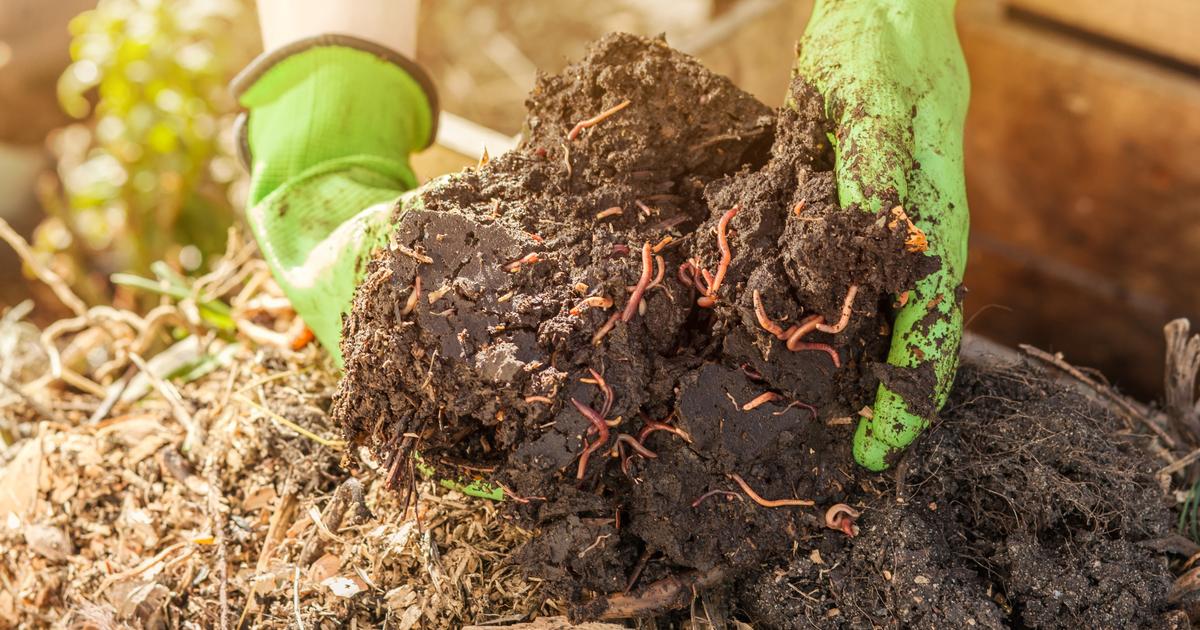Having your own compost heap can be pretty handy, but it shouldn't be misused for things that aren't supposed to be there.
You can find out what these are here.
A compost in the garden has several advantages.
On the one hand, it is ideally suited for waste from the garden or kitchen, which then does not have to be disposed of in the garbage can or recycling center.
On the other hand, compost will also provide valuable fertilizer for the garden at some point.
But it's not that simple after all, because not everything is allowed on the compost.
Compost in the garden: these things do not belong in it
A compost is usually a well-thought-out construction that allows waste to rot very quickly.
We are
dependent
on
the correct creation of a compost heap
, as well as on the help of animals such as compost worms.
Because the best composter is of no use if incorrectly layered or unsuitable material is used for filling.
If the compost is then - this can also be done on the balcony - everything can finally be placed on it.
Or is it not?
No, because the compost is neither a bio bin nor a dung heap.
+
Ideally, the finished compost should then look like this (symbol image).
© Martina Raedlein / CHROMORANGE / Imago
In fact, compost only works if it's properly laid out and not all of the rubbish is thrown in.
After all, you will use the compost later as
fertilizer for fruit or vegetables
.
Gardening advisor
You can find more exciting gardening topics at 24garten.de *.
Also interesting
: That's why you shouldn't just throw away mowed grass.
Compost in the garden: never put ashes in it
The following things are not allowed on the compost:
Certain foods
: In principle, only raw fruit or vegetable remains should be placed on the compost. Cooked, baked or grilled dishes usually contain spices, and they could also attract animals such as rats, martens or crows and more. Therefore, do not throw anything cooked on the compost, baked goods, meat or bones. In addition, dairy products have no place there. There can also be problems if fruits or vegetables have been treated. Sometimes pollutants remain or the peel does not rot.
Citrus fruits
: Citrus fruits on the compost can be problematic.
Yes, they are raw and, at best, organic quality.
However, these pots can take much longer to rot, so patience is required.
Cut the peel into small pieces beforehand, this will also speed up the process.
Purchased cut flowers
: Cut flowers are beautiful, colorful and natural, therefore ideal for compost, one would think.
But mass-produced goods in particular are often full of pesticides.
So either rely on organically grown flowers or pick the bouquet yourself in the garden, then it can be composted.
Charcoal
: While certain charcoals can be quite healthy for house plants in and of themselves, they are only allowed on the compost under certain conditions and in small amounts.
The charcoal must not contain alcohol, must be free of heavy metals and must not have been in contact with chemicals, oil or fat.
It goes without saying that the coal also has to be cold.
ash
Certain foliage
: some foliage rots very slowly or becomes more of a sticky mass.
Therefore, leaves of walnut, oak, cherry laurel, poplar, plane tree, oak and beech should not be on the compost.
No chestnut leaves or ginkgo either.
Of course, you can still try.
Animal droppings
: Animal droppings from dogs, cats and the like have no place on our future fertilizer.
In
addition, you should never dispose of
sick plants
in the compost
Everything that is not a plant
: Including glass, metal, lacquer, medication and whatever else arises in the household
It can also make sense not to compost some weeds after they have been removed.
Especially with stubborn plants such as ground elder, the seeds would be redistributed with the compost.
Some animal litter says it is compostable.
Basically, you can try this, but the ingredients are sometimes scented or otherwise treated.
+
Not everything that has to be disposed of can be put on the compost.
(Symbol image)
© Tohier P / Andia.fr / Imago
Compost in the garden: garden waste is welcome
Otherwise, gardening fans can of course compost garden waste, lawn clippings should ideally be a little dry, larger branches can be cut into small pieces or chopped up.
Grass clippings are even better suited for mulching.
Toxic plants on the compost are usually not a problem, as toxins decompose during composting.
Incidentally, simply burning garden waste or dumping it in the forest is not a good (and legal) idea.
Proper composting is not difficult, however.
During the subsequent application, it should be clear in advance whether the plants can tolerate compost, because some do not.
* 24garten.de is an offer from IPPEN.MEDIA.
Don't want to miss any tips about gardens and household chores?
Here you can subscribe to our living guide
Also read
: Leaf removal: how to dispose of it and who is responsible?
These ten mistakes can ruin your garden
These ten mistakes can ruin your garden
List of rubric lists: © Tohier P / Andia.fr / Imago






